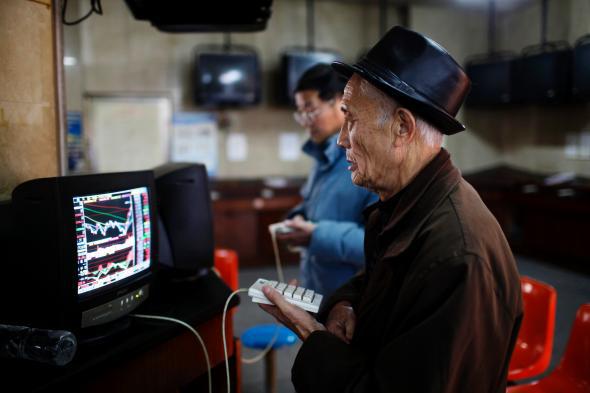After a few weeks of relative peace and quiet, China’s stock market is careening downhill again, and the government is trying to stop the landslide. On Monday, shares saw their biggest one-day drop since 2007. Tuesday, they dipped a bit more, capping three straight days of losses that have cut 11 percent off the Shanghai Composite Index. In response, the country’s regulators have promised to continue pouring money into equities to pump prices back up.
Is the rescue attempt good for China? I’m starting to think that it’s not—and that the country would be better off if the government failed and this crash continued.
Mind you, the current leadership of China’s government wouldn’t be better off, seeing how it has staked a not insignificant bit of its reputation on a promise to salvage what very much looks like an unsalvageable situation. Urged on by a cheerleading state-backed media, millions of first-time Chinese investors piled into stocks just as the bubble was getting ready to blow. They got creamed when the market fell by about a third between June and early July. And since then, the government has taken extraordinary rescue steps: Regulators have stepped in to essentially buy shares, suspended new IPOs, allowed massive swaths of the market to stop trading, and loosened monetary policy and rules on lending. If the kitchen-sink approach falls flat, a lot of people are going to lose confidence in the Communist Party’s ability to stabilize the markets.
But that wouldn’t necessarily be the worst thing, long term. The government shouldn’t be stabilizing stocks, and if its current scheme works, it would set a terrible precedent for the future.
In general, it’s reasonable for a government to step in and calm down markets when there’s a panic that threatens long-term economic stability. If there’s a run on the financial system, for instance, it’s probably time to act, since banking collapses have a way of leading to depressions. Thankfully, China’s fledgling equities market isn’t that important in the grand scheme of things. It’s relatively small compared with the overall size of the country’s economy, and Chinese households only keep about 9 percent of their wealth in stocks. Even if share prices fall through the floor, the damage shouldn’t have that much of an effect on how families and businesses decide to spend. So the current stock decline could be a chance for the country to learn a lesson about stock bubbles while the repercussions are still small and containable.
If Beijing does manage to put a floor under stock prices, however, it will have bought itself a much bigger problem. Namely, it will be stuck supporting the market for the foreseeable future. After all, once the government promises to keep stock prices from falling, it can’t suddenly turn around and say: “Sorry investors, you guys are on your own.” Otherwise, prices will just crash again.
Why would that be a drag for China? First, vowing to back a whole stock market is an expensive promise—especially when Beijing is essentially guaranteeing that a massive bubble will stay inflated in perpetuity. Remember, the government has been resorting to actual share purchases, as well as loosening the overall credit environment, which creates its own potential dangers for the economy. The bigger the bubble gets, the bigger the challenge of keeping it from one day popping. Longer term, the Communist Party would like its markets to attract international investors, which is hard to do when it looks like the government is essentially running the whole game from Beijing. Better that shares crash now, and the government learns there are some things it can’t, and shouldn’t, micromanage.
